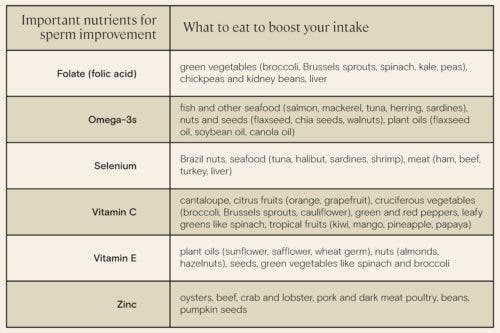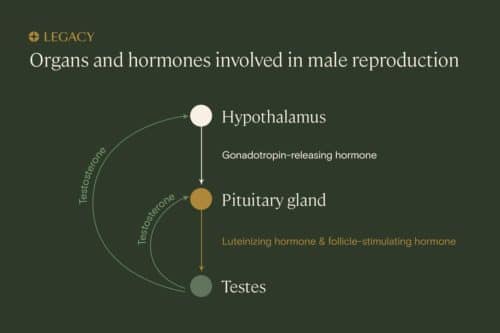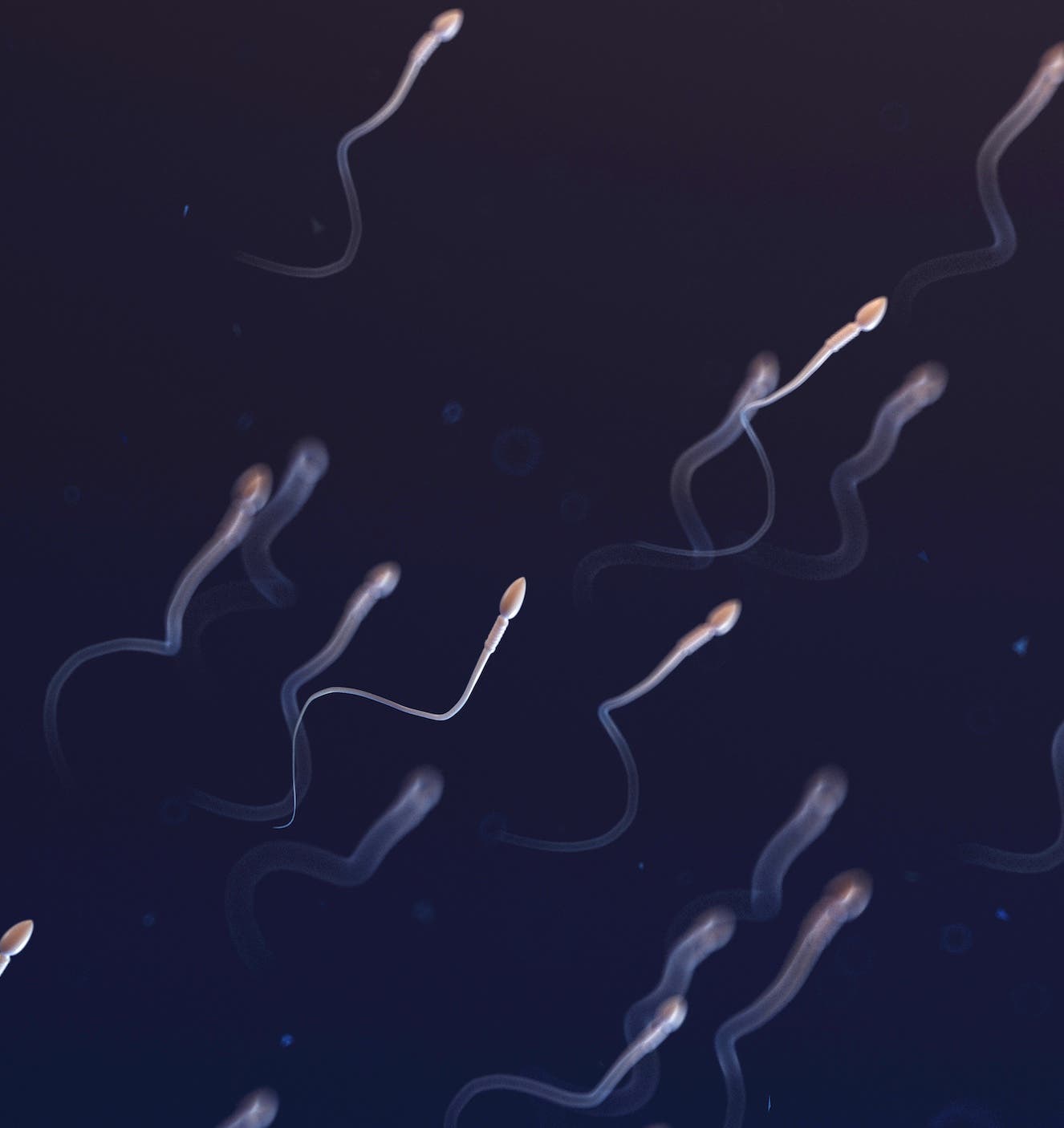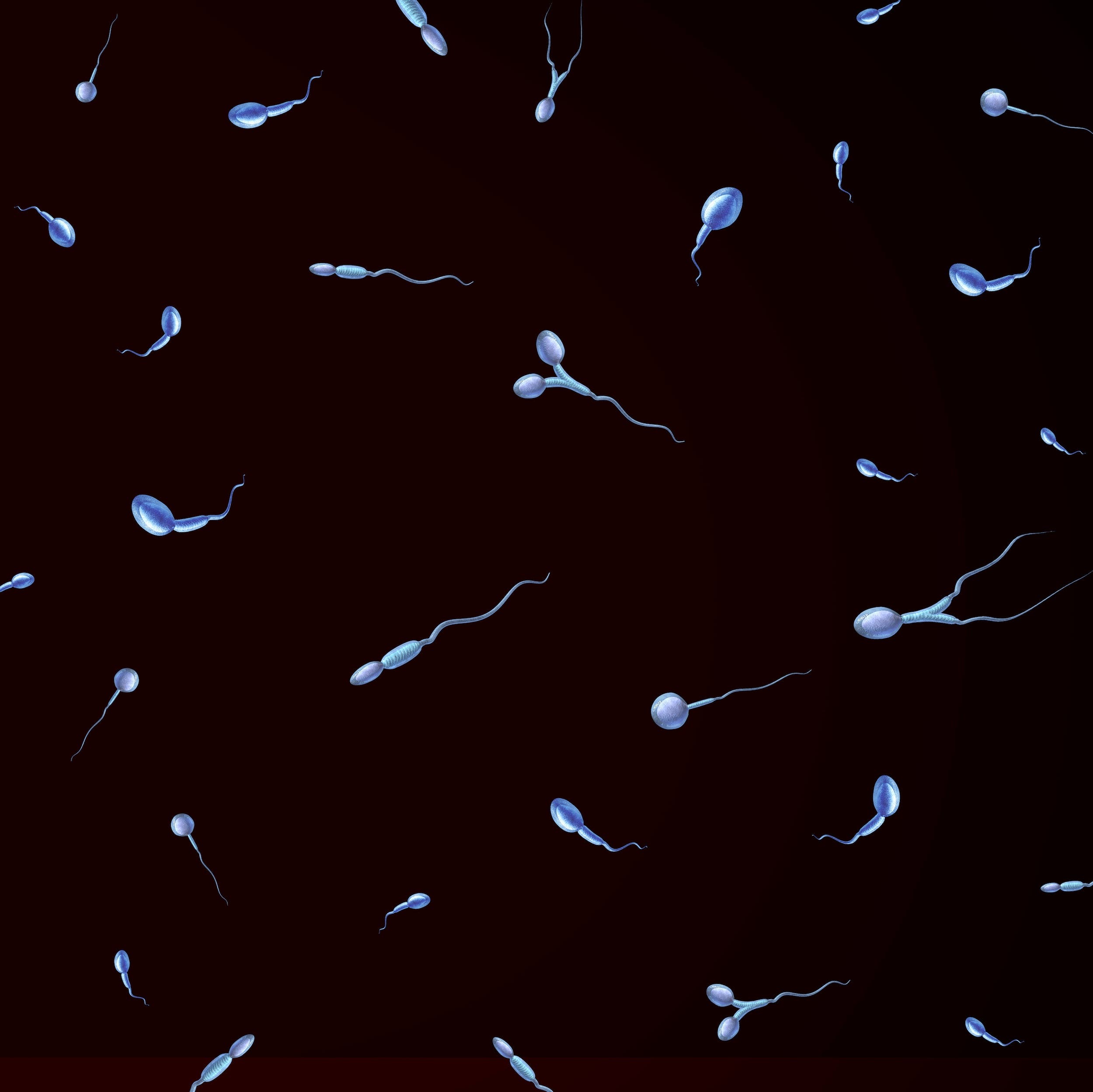Testosterone is an essential hormone for fertility, but it’s also vital for other parts of your body. However, testosterone decreases as a result of age and other factors. This sometimes leads to testosterone deficiency and can affect your overall health.
You may wonder how you can increase your testosterone levels naturally, and if certain foods can help (or hurt). We’ll look into the role of testosterone in the body, why testosterone levels decrease, and which diets and foods may affect testosterone levels.
Takeaways:
- Testosterone is important for sperm production and fertility, but it also affects muscle mass, bone density, and mood.
- Testosterone naturally decreases with age, but can also decline as a result of medications, health conditions, alcohol abuse, and stress.
- Research suggests that the keto and carnivore diets may increase testosterone, though they may have a negative impact on overall fertility and their long-term health effects are unclear.
- A plant-based diet appears to have no effect — positive or negative — on testosterone.
- Certain nutrients found in food and supplements, like selenium, zinc, and fenugreek, may also help increase testosterone levels.
Total testosterone vs. free testosterone
When discussing testosterone, it’s helpful to understand the difference between “total testosterone” and “free testosterone.”
Most testosterone in your body is bound to proteins. Around 2% of testosterone is unbound, which is known as free testosterone. Free and weakly bound testosterone is available for use by the body.
Some research has found that even if your total testosterone levels are normal, low amounts of free testosterone may be associated with conditions like erectile dysfunction. However, studies are still investigating the health impacts of total, free, and bioavailable testosterone levels.
How diet affects testosterone
Diet and testosterone are linked. The foods you eat may reduce — or help increase — your testosterone levels.
According to a 2021 study, men who ate a more pro-inflammatory diet (high in refined carbohydrates and saturated fats) had lower total testosterone levels than those who ate less inflammatory foods. In addition, those with the highest intake of a pro-inflammatory diet had a 29.6% higher chance of testosterone deficiency compared to those with the least inflammatory diets.
Research shows a connection between inflammation and reduced testosterone production. In addition, eating a pro-inflammatory diet is associated with weight gain and increased risk of obesity, which in turn is linked to lower testosterone levels.
Does the keto diet increase testosterone?
The ketogenic (keto) diet involves eating lots of fats, some protein, and small amounts of carbohydrates. The idea is to prevent your body from using glucose from carbs as an energy source. When you reduce your carb intake enough, your body enters a state called ketosis, where it gets energy from ketones instead, which are produced by fat.
Besides being a popular diet for weight loss, the keto diet may help increase testosterone, according to some research.
One study of 25 college-aged men doing a resistance training program for 11 weeks found that eating a ketogenic diet was associated with significantly increased total testosterone levels compared to eating a traditional Western diet. In both groups, fat body mass decreased while lean body mass, strength, and power increased.
According to another study, people with type 2 diabetes also experienced a significant increase in testosterone — as well as vitamin D levels — after following a ketogenic diet.
Keto tends to increase the intake of cholesterol, which is important for the production of testosterone and may result in the increase seen in studies. The diet’s long-term health effects are still unclear, though, and more research needs to be done.
On the other hand, low-fat diets — the opposite of keto — were associated with slightly lower testosterone levels in a study from 2020. The study controlled for age, body mass index, activity levels, and other factors. However, it concluded that the difference in testosterone levels between low-fat and nonrestrictive diets was small.
Does a carnivore diet increase testosterone?
The carnivore diet is a form of keto that removes plant-based foods to cut carbs, focusing almost entirely on consuming animal products. There’s a lot of mythology around the carnivore diet, as higher consumption of foods like red meat is considered more “masculine.”
While the carnivore diet may increase testosterone, more studies are needed, and the impact of the carnivore diet on fertility may be overall negative. Some research indicates that a diet very high in fat and low in carbohydrates (similar to the carnivore diet or keto diet) may increase total testosterone levels.
Another study also found higher testosterone levels in men eating a high-fat, low-fiber diet compared to a low-fat, high-fiber diet.
However, there’s still very little research on the carnivore diet. Even if it increases testosterone, studies indicate that diets high in processed red meat are associated with decreased sperm health, an important factor for fertility.
Eating a lot of processed meat and eliminating nutrients from plants in your diet may also result in other health issues, such as:
- gastrointestinal disorders from lack of fiber
- an increased risk of colorectal cancer
- a higher chance of coronary heart disease
- greater risk of type 2 diabetes
Like the ketogenic diet, more research needs to be done on the carnivore diet’s long-term effects on fertility and overall health.
Does a plant-based diet affect testosterone levels?
A plant-based diet emphasizes whole, plant-based foods like vegetables, fruits, and legumes while limiting meat, dairy, and processed foods. Plant-based diets include vegan diets, but may also include less restrictive vegetarian or “flexitarian” diets that don’t entirely eliminate animal foods.
Research indicates that plant-based and vegan diets have little effect on testosterone. Other studies have also found that a vegan diet doesn’t impact total or free testosterone. While plant-based diets may not increase testosterone, they’re also unlikely to negatively impact testosterone levels.
At the same time, plant-based diets offer other health benefits, such as a reduced risk of coronary heart disease, obesity, and type 2 diabetes. Obesity is associated with lower testosterone, so plant-based diets may help you avoid this condition and its effects on your hormone levels and fertility.
Research also suggests that diets rich in plant-based foods including vegetables, fruits, and nuts are linked to improved sperm quality, which may be helpful if you’re trying to conceive.
What about soy and testosterone?
One food group in the plant-based diet often causes confusion. You may have heard that eating soy can affect your sperm, testosterone, and fertility.
Soy contains compounds called phytoestrogens, which are similar in structure to estradiol (an estrogen). The worry is that eating phytoestrogens may raise your estrogen levels, which may affect fertility.
However, research indicates that you’d need to eat about 40–70mg per day of isoflavones, a phytoestrogen found in soy, to see an effect on your health. On average, people in Asia consume around 15–50mg per day of isoflavones while people in Western countries eat around 2mg each day.
Consequently, a research review found that regular consumption of soy protein or isoflavones had no significant effect on testosterone levels in men.
Studies are ongoing regarding the effect of soy on health and fertility. Soy does not currently appear to lower testosterone levels or affect sperm health, but if you’re concerned about your fertility, you may consider limiting your consumption of soy.
Nutrients and herbs that may improve testosterone levels
Specific nutrients in foods and supplements may help increase your testosterone levels.
Selenium
A small study of 12 infertile men found that taking 50 micrograms of selenium each day for three months was associated with improved sperm parameters and significantly increased testosterone levels. The selenium may have had a positive effect on Leydig cells, the cells that produce testosterone in the testicles.
However, other research has indicated that selenium supplements may increase the risk of prostate cancer in men who already have high selenium levels.
Selenium is an essential nutrient for your overall health. Foods high in selenium include:
- seafood
- brazil nuts
- organ meats
- dairy products
- grains
- eggs
Zinc
Zinc appears to be important for testosterone. One study found that blood levels of testosterone were correlated to blood levels of zinc. Restricting zinc led to a decrease in testosterone, while taking zinc supplements led to an increase.
If you already consume enough zinc through your diet, research suggests that a zinc supplement won’t increase your testosterone levels further.
You can increase your dietary intake of zinc through foods like:
- oysters
- red meat
- chicken
- beans
- nuts
- whole grains
Fenugreek
Fenugreek is an herb used in cooking and as a dietary supplement.
One study found that taking 600 mg per day of Testofen (a fenugreek seed extract) for 12 weeks was associated with increased total and free testosterone levels, compared to a control group.
However, there’s still insufficient research to support the use of fenugreek for most health conditions, including testosterone levels.

Why are testosterone levels important?
Testosterone and spermatogenesis
Testosterone is one of the primary hormones that affect male fertility. Along with follicle stimulating hormone (FSH), luteinizing hormone (LH), and other hormones, testosterone plays an important role in spermatogenesis, or the production of sperm.
Testosterone is required for spermatogenesis to progress past its second phase, meiosis, involving cell division. The hormone is also vital for the differentiation of sperm cells and for mature sperm to be released. Levels of testosterone are significantly higher in the testes compared to the blood, and these elevated levels are necessary for normal sperm production.
What else does testosterone do in the body?
Besides aiding sperm production, testosterone influences many areas in the body. It plays a role in sexual development, including the descent of the testes, and contributes to changes during puberty, such as the development of the genitals, the growth of pubic and facial hair, and voice deepening. Testosterone also affects:
- muscle mass
- bone density
- body fat levels
- libido and other sexual functions
- red blood cell production
- mood and well-being
Therefore, testosterone deficiency can result in problems in any of the above areas. As testosterone declines as a result of age and other factors, lean body mass and bone density may decrease, while the chances of cardiovascular disease and metabolic syndrome rise.

Why does testosterone decrease?
Testosterone is created in the testes. The production of testosterone is driven by follicle stimulating hormone (FSH) and luteinizing hormone (LH), both of which come from the pituitary gland. FSH and LH are influenced by gonadotropin-releasing hormone (GnRH) from the hypothalamus. This is known as the hypothalamus-pituitary-gonadal axis. Anything that impacts the organs involved in this axis can ultimately affect testosterone levels.
Most people with testes experience a gradual decrease in testosterone blood levels as they get older. On average, total testosterone levels will decrease by around 1% each year after age 30. Additionally, the levels of proteins that bind to testosterone may increase with age, potentially lowering the amount of free and bioavailable testosterone in the body. Research shows that around 20% of men in their 60s and 50% of men in their 80s have testosterone deficiency, or hypogonadism.
In addition to age, other causes of declining testosterone can include:
- diseases such as diabetes, anemia, HIV, obesity, and cancer (such as a brain tumor near the pituitary gland)
- certain medications, including antidepressants, statins, opioids, steroids, antipsychotic medications, lithium, and anticonvulsants
- chemotherapy or radiation therapy
- infection of the testes
- genetic conditions like Klinefelter syndrome, in which an extra X chromosome is present at birth that can cause abnormalities in the testicles
- injury or trauma to the testicles
- alcohol abuse
- stress
- excessive exercise
- diet
If you’re looking to increase testosterone levels or improve your fertility, see our sperm improvement guide or check out male fertility supplements that can help fill in the gaps.



